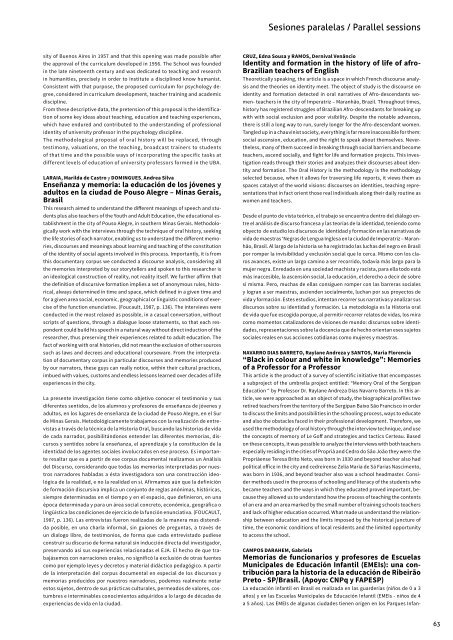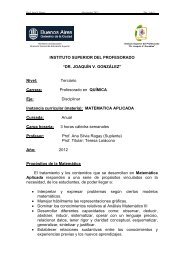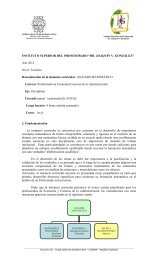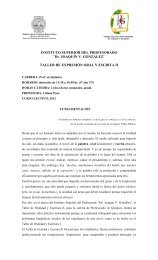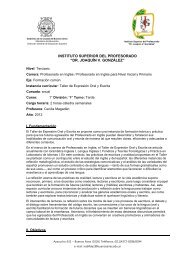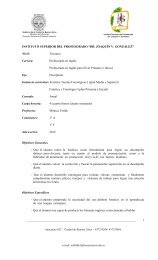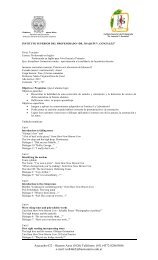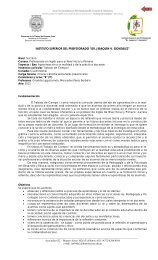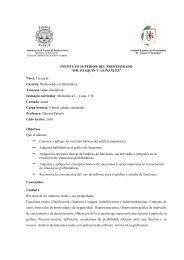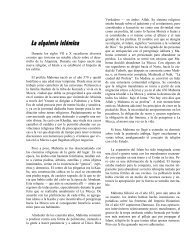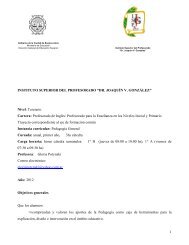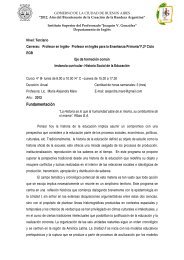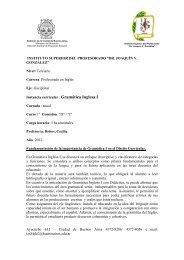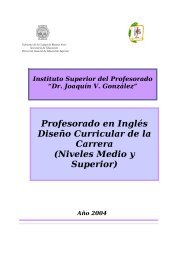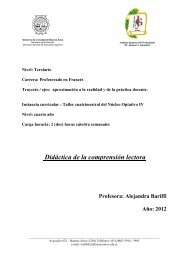Los retos de la historia oral en el siglo XXI: diversidades ...
Los retos de la historia oral en el siglo XXI: diversidades ...
Los retos de la historia oral en el siglo XXI: diversidades ...
Create successful ePaper yourself
Turn your PDF publications into a flip-book with our unique Google optimized e-Paper software.
Sesiones parale<strong>la</strong>s / Parall<strong>el</strong> sessionssity of Bu<strong>en</strong>os Aires in 1957 and that this op<strong>en</strong>ing was ma<strong>de</strong> possible afterthe approval of the curriculum <strong>de</strong>v<strong>el</strong>oped in 1956. The School was foun<strong>de</strong>din the <strong>la</strong>te ninete<strong>en</strong>th c<strong>en</strong>tury and was <strong>de</strong>dicated to teaching and researchin humanities, precis<strong>el</strong>y in or<strong>de</strong>r to institute a disciplined know humanist.Consist<strong>en</strong>t with that purpose, the proposed curriculum for psychology <strong>de</strong>gree,consi<strong>de</strong>red in curriculum <strong>de</strong>v<strong>el</strong>opm<strong>en</strong>t, teacher training and aca<strong>de</strong>micdiscipline.From these <strong>de</strong>scriptive data, the pret<strong>en</strong>sion of this proposal is the i<strong>de</strong>ntificationof some key i<strong>de</strong>as about teaching, education and teaching experi<strong>en</strong>ces,which have <strong>en</strong>dured and contributed to the un<strong>de</strong>rstanding of professionali<strong>de</strong>ntity of university professor in the psychology discipline.The methodological proposal of <strong>oral</strong> history will be rep<strong>la</strong>ced, throughtestimony, valuations, on the teaching, broadcast trainers to stu<strong>de</strong>ntsof that time and the possible ways of incorporating the specific tasks atdiffer<strong>en</strong>t lev<strong>el</strong>s of education of university professors formed in the UBA.LARAIA, Marilda <strong>de</strong> Castro y DOMINGUES, Andrea SilvaEnseñanza y memoria: <strong>la</strong> educación <strong>de</strong> los jóv<strong>en</strong>es yadultos <strong>en</strong> <strong>la</strong> ciudad <strong>de</strong> Pouso Alegre – Minas Gerais,BrasilThis research aimed to un<strong>de</strong>rstand the differ<strong>en</strong>t meanings of speech and stu<strong>de</strong>ntsplus also teachers of the Youth and Adult Education, the educational establishm<strong>en</strong>tin the city of Pouso Alegre, in southern Minas Gerais. Methodologicallywork with the interviews through the technique of <strong>oral</strong> history, seekingthe life stories of each narrator, <strong>en</strong>abling us to un<strong>de</strong>rstand the differ<strong>en</strong>t memories,discourses and meanings about learning and teaching of the constitutionof the i<strong>de</strong>ntity of social ag<strong>en</strong>ts involved in this process. Importantly, it is fromthis docum<strong>en</strong>tary corpus we conducted a discourse analysis, consi<strong>de</strong>ring allthe memories interpreted by our storyt<strong>el</strong>lers and spok<strong>en</strong> to this researcher isan i<strong>de</strong>ological construction of reality, not reality its<strong>el</strong>f. We further affirm thatthe <strong>de</strong>finition of discursive formation implies a set of anonymous rules, historical,always <strong>de</strong>termined in time and space, which <strong>de</strong>fined in a giv<strong>en</strong> time andfor a giv<strong>en</strong> area social, economic, geographical or linguistic conditions of exerciseof the function <strong>en</strong>unciative. (Foucault, 1987, p. 136). The interviews wereconducted in the most re<strong>la</strong>xed as possible, in a casual conversation, withoutscripts of questions, through a dialogue loose statem<strong>en</strong>ts, so that each respon<strong>de</strong>ntcould build his speech in a natural way without direct induction of theresearcher, thus preserving their experi<strong>en</strong>ces re<strong>la</strong>ted to adult education. Thefact of working with <strong>oral</strong> histories, did not mean the exclusion of other sourcessuch as <strong>la</strong>ws and <strong>de</strong>crees and educational courseware. From the interpretationof docum<strong>en</strong>tary corpus in particu<strong>la</strong>r discourses and memories producedby our narrators, these guys can really notice, within their cultural practices,imbued with values, customs and <strong>en</strong>dless lessons learned over <strong>de</strong>ca<strong>de</strong>s of lifeexperi<strong>en</strong>ces in the city.La pres<strong>en</strong>te investigación ti<strong>en</strong>e como objetivo conocer <strong>el</strong> testimonio y susdifer<strong>en</strong>tes s<strong>en</strong>tidos, <strong>de</strong> los alumnos y profesores <strong>de</strong> <strong>en</strong>señanza <strong>de</strong> jóv<strong>en</strong>es yadultos, <strong>en</strong> los lugares <strong>de</strong> <strong>en</strong>señanza <strong>de</strong> <strong>la</strong> ciudad <strong>de</strong> Pouso Alegre, <strong>en</strong> <strong>el</strong> Sur<strong>de</strong> Minas Gerais. Metodológicam<strong>en</strong>te trabajamos con <strong>la</strong> realización <strong>de</strong> <strong>en</strong>trevistasa través <strong>de</strong> <strong>la</strong> técnica <strong>de</strong> <strong>la</strong> Historia Oral, buscando <strong>la</strong>s <strong>historia</strong>s <strong>de</strong> vida<strong>de</strong> cada narrador, posibilitándonos <strong>en</strong>t<strong>en</strong><strong>de</strong>r <strong>la</strong>s difer<strong>en</strong>tes memorias, discursosy s<strong>en</strong>tidos sobre <strong>la</strong> <strong>en</strong>señanza, <strong>el</strong> apr<strong>en</strong>dizaje y <strong>la</strong> constitución <strong>de</strong> <strong>la</strong>i<strong>de</strong>ntidad <strong>de</strong> los ag<strong>en</strong>tes sociales involucrados <strong>en</strong> ese proceso. Es importanteresaltar que es a partir <strong>de</strong> ese corpus docum<strong>en</strong>tal realizamos un Análisis<strong>de</strong>l Discurso, consi<strong>de</strong>rando que todas <strong>la</strong>s memorias interpretadas por nuestrosnarradores hab<strong>la</strong>das a ésta investigadora son una construcción i<strong>de</strong>ológica<strong>de</strong> <strong>la</strong> realidad, e no <strong>la</strong> realidad <strong>en</strong> si. Afirmamos aún que <strong>la</strong> <strong>de</strong>finición<strong>de</strong> formación discursiva implica un conjunto <strong>de</strong> reg<strong>la</strong>s anónimas, históricas,siempre <strong>de</strong>terminadas <strong>en</strong> <strong>el</strong> tiempo y <strong>en</strong> <strong>el</strong> espacio, que <strong>de</strong>finieron, <strong>en</strong> unaépoca <strong>de</strong>terminada y para un área social concreto, económica, geográfica olingüística <strong>la</strong>s condiciones <strong>de</strong> ejercicio <strong>de</strong> <strong>la</strong> función <strong>en</strong>unciativa. (FOUCAULT,1987, p. 136). Las <strong>en</strong>trevistas fueron realizadas <strong>de</strong> <strong>la</strong> manera mas dist<strong>en</strong>didaposible, <strong>en</strong> una char<strong>la</strong> informal, sin guiones <strong>de</strong> preguntas, a través <strong>de</strong>un dialogo libre, <strong>de</strong> testimonios, <strong>de</strong> forma que cada <strong>en</strong>trevistado pudieseconstruir su discurso <strong>de</strong> forma natural sin inducción directa <strong>de</strong>l investigador,preservando así sus experi<strong>en</strong>cias re<strong>la</strong>cionadas <strong>el</strong> EJA. El hecho <strong>de</strong> que trabajásemoscon narraciones <strong>oral</strong>es, no significó <strong>la</strong> exclusión <strong>de</strong> otras fu<strong>en</strong>tescomo por ejemplo leyes y <strong>de</strong>c<strong>retos</strong> y material didáctico pedagógico. A partir<strong>de</strong> <strong>la</strong> interpretación <strong>de</strong>l corpus docum<strong>en</strong>tal <strong>en</strong> especial <strong>de</strong> los discursos ymemorias producidos por nuestros narradores, po<strong>de</strong>mos realm<strong>en</strong>te notarestos sujetos, <strong>de</strong>ntro <strong>de</strong> sus prácticas culturales, permeados <strong>de</strong> valores, costumbrese interminables conocimi<strong>en</strong>tos adquiridos a lo <strong>la</strong>rgo <strong>de</strong> décadas <strong>de</strong>experi<strong>en</strong>cias <strong>de</strong> vida <strong>en</strong> <strong>la</strong> ciudad.CRUZ, Edna Sousa y RAMOS, Dernival V<strong>en</strong>âncioI<strong>de</strong>ntity and formation in the history of life of afro-Brazilian teachers of EnglishTheoretically speaking, the article is a space in which Fr<strong>en</strong>ch discourse analysisand the theories on i<strong>de</strong>ntity meet. The object of study is the discourse oni<strong>de</strong>ntity and formation <strong>de</strong>tected in <strong>oral</strong> narratives of Afro-<strong>de</strong>sc<strong>en</strong>dants wom<strong>en</strong>-teachers in the city of Imperatriz – Maranhão, Brazil. Throughout times,history has registered struggles of Brazilian Afro-<strong>de</strong>sc<strong>en</strong>dants for breaking upwith with social exclusion and poor visibility. Despite the notable advances,there is still a long way to run, sur<strong>el</strong>y longer for the Afro-<strong>de</strong>sc<strong>en</strong>dant wom<strong>en</strong>.Tangled up in a chauvinist society, everything is far more inaccessible for them:social asc<strong>en</strong>sion, education, and the right to speak about thems<strong>el</strong>ves. Neverth<strong>el</strong>ess,many of them succeed in breaking through social barriers and becometeachers, asc<strong>en</strong>d socially, and fight for life and formation projects. This investigationreads through their stories and analyzes their discourses about i<strong>de</strong>ntityand formation. The Oral History is the methodology is the methodologys<strong>el</strong>ected because, wh<strong>en</strong> it allows for traversing life reports, it views them asspaces catalyst of the world visions: discourses on i<strong>de</strong>ntities, teaching repres<strong>en</strong>tationsthat in fact ori<strong>en</strong>t those real individuals along their daily routine aswom<strong>en</strong> and teachers.Des<strong>de</strong> <strong>el</strong> punto <strong>de</strong> vista teórico, <strong>el</strong> trabajo se <strong>en</strong>cu<strong>en</strong>tra <strong>de</strong>ntro <strong>de</strong>l diálogo <strong>en</strong>tre<strong>el</strong> análisis <strong>de</strong> discurso francesa y <strong>la</strong>s teorías <strong>de</strong> <strong>la</strong> i<strong>de</strong>ntidad, t<strong>en</strong>i<strong>en</strong>do comoobyecto <strong>de</strong> estudio los discursos <strong>de</strong> i<strong>de</strong>ntidad y formación <strong>en</strong> <strong>la</strong>s narrativas <strong>de</strong>vida <strong>de</strong> maestras ‘Negras <strong>de</strong> L<strong>en</strong>gua Inglesa <strong>en</strong> <strong>la</strong> ciudad <strong>de</strong> Imperatriz – Maranhão,Brasil. Al <strong>la</strong>rgo <strong>de</strong> <strong>la</strong> <strong>historia</strong> se ha registrado <strong>la</strong>s luchas <strong>de</strong>l negro <strong>en</strong> Brasilpor romper <strong>la</strong> invisibilidad y exclusión social que lo cerca. Mismo con los c<strong>la</strong>rosavances, existe un <strong>la</strong>rgo camino a ser recorrido, todavía más <strong>la</strong>rgo para <strong>la</strong>mujer negra. Enredada <strong>en</strong> una sociedad machista y racista, para <strong>el</strong><strong>la</strong> todo estámás inaccesible, <strong>la</strong> asc<strong>en</strong>sión social, <strong>la</strong> educación, <strong>el</strong> <strong>de</strong>recho a <strong>de</strong>cir <strong>de</strong> sobresí misma. Pero, muchas <strong>de</strong> <strong>el</strong><strong>la</strong>s consigu<strong>en</strong> romper con <strong>la</strong>s barreras socialesy logran a ser maestras, asci<strong>en</strong><strong>de</strong>n socialm<strong>en</strong>te, luchan por sus proyectos <strong>de</strong>vida y formación. Estes estudios, int<strong>en</strong>tan recorrer sus narrativas y analizar susdiscursos sobre su i<strong>de</strong>ntidad y formación. La metodología es <strong>la</strong> Historia <strong>oral</strong><strong>de</strong> vida que fue escogida porque, al permitir recorrer re<strong>la</strong>tos <strong>de</strong> vidas, los miracomo mom<strong>en</strong>tos catalizadores <strong>de</strong> visiones <strong>de</strong> mundo: discursos sobre i<strong>de</strong>ntida<strong>de</strong>s,repres<strong>en</strong>taciones sobre <strong>la</strong> doc<strong>en</strong>cia que <strong>de</strong> hecho ori<strong>en</strong>tan eses sujetossociales reales <strong>en</strong> sus acciones cotidianas como mujeres y maestras.Navarro Dias Barreto, Ray<strong>la</strong>ne Andreza y SANTOS, Maria Flor<strong>en</strong>cia“B<strong>la</strong>ck in colour and white in knowledge”: Memoriesof a Professor for a ProfessorThis article is the product of a survey of sci<strong>en</strong>tific initiative that <strong>en</strong>compassesa subproject of the umbr<strong>el</strong><strong>la</strong> project <strong>en</strong>titled: “Memory Oral of the SergipanEducation “ by Professor Dr. Ray<strong>la</strong>ne Andreza Dias Navarro Barreto. In this article,we were approached as an object of study, the biographical profiles tworetired teachers from the territory of the Sergipan Baixo São Francisco in or<strong>de</strong>rto discuss the limits and possibilities in the schooling process, ways to educateand also the obstacles faced in their professional <strong>de</strong>v<strong>el</strong>opm<strong>en</strong>t. Therefore, weused the methodology of <strong>oral</strong> history through the interview technique, and usethe concepts of memory of Le Goff and strategies and tactics Certeau. Basedon these concepts, it was possible to analyze the interviews with both teachersespecially residing in the cities of Propriá and Cedro do São João they were: thePropriá<strong>en</strong>se Teresa Brito Neto, was born in 1930 and beyond teacher also hadpolitical office in the city and cedreir<strong>en</strong>se Z<strong>el</strong>ia Maria <strong>de</strong> Sá Farias Nascim<strong>en</strong>to,was born in 1936, and beyond teacher also was a school headmaster. Consi<strong>de</strong>rmethods used in the process of schooling and literacy of the stu<strong>de</strong>nts whobecame teachers and the ways in which they educated proved important, becausethey allowed us to un<strong>de</strong>rstand how the process of teaching the cont<strong>en</strong>tsof an era and an area marked by the small number of training schools teachersand <strong>la</strong>ck of higher education occurred. What ma<strong>de</strong> us un<strong>de</strong>rstand the re<strong>la</strong>tionshipbetwe<strong>en</strong> education and the limits imposed by the historical juncture oftime, the economic conditions of local resi<strong>de</strong>nts and the limited opportunityto access the school.CAMPOS DARAHEM, Gabrie<strong>la</strong>Memorias <strong>de</strong> funcionarios y profesores <strong>de</strong> Escue<strong>la</strong>sMunicipales <strong>de</strong> Educación Infantil (EMEIs): una contribuciónpara <strong>la</strong> <strong>historia</strong> <strong>de</strong> <strong>la</strong> educación <strong>de</strong> RibeirãoPreto - SP/Brasil. (Apoyo: CNPq y FAPESP)La educación infantil <strong>en</strong> Brasil es realizada <strong>en</strong> <strong>la</strong>s guar<strong>de</strong>rías (niños <strong>de</strong> 0 a 3años) y <strong>en</strong> <strong>la</strong>s Escue<strong>la</strong>s Municipales <strong>de</strong> Educación Infantil (EMEIs - niños <strong>de</strong> 4a 5 años). Las EMEIs <strong>de</strong> algunas ciuda<strong>de</strong>s ti<strong>en</strong><strong>en</strong> oríg<strong>en</strong> <strong>en</strong> los Parques Infan-63


